- Home
- Lynne Truss
A Shot in the Dark Page 2
A Shot in the Dark Read online
Page 2
But no one cared what this little bespectacled assistant manager thought. Loud shots were fired at the ceiling, as the two robbers gathered the bags of loot in the middle of the banking hall. This was especially terrifying for Crystal. With his head in the sack, he alone couldn’t tell the direction she was firing.
‘I’m not kidding!’ The woman was concluding the proceedings. ‘I promise I’ll shoot the next person who speaks. Now, I’m asking: any more for any more?’
At which point, she and her confederate had left the building with untraceable notes to the value of £25,000, never to be caught.
Crystal had at first seemed untroubled by the bank raid. For three months or so after the Aldersgate Stick-up (as the incident came to be known), he waved aside all offers of sympathy, and continued his work at the Albion Bank. And then one day he found himself on a number 8 bus in New Oxford Street, weeping and shaking uncontrollably. For the next six weeks, his mother fed him oxtail soup in bed at home in Hoxton, and when he finally re-emerged, unsteady, into the world, he found strange but wonderful solace in the theatre.
There was something cocoon-like in the darkness and the plush seats of those West End spaces; even if guns were fired in the plays, the bangs were planned for, written, part of the design. He loved drawing-room comedies and well-made plays. He revered the work of Terence Rattigan. Above all, he loved the community of the audience together in the dark – although people sometimes noisily vacated the seat next to him. After a while, he started submitting critical articles and feature pieces to the weekly papers, which he was delighted to see in print.
Not that he was a pushover as a critic; quite the reverse. He simply applied his own rule of thumb. When he saw beauty and wit and order reflected on the stage, he hailed it. Conversely, when he saw ugliness, passion and violence, he bowed to no one in his determination to stamp them out. It was the same feeling he had had during the bank raid: when something needed saying…
Tonight’s play stood for everything Crystal detested. True, he hadn’t seen it yet, but he knew all about its writer Jack Braithwaite’s infantile ambitions to shock and outrage the theatre-going public. This being 1957, a revolution was already tearing down the comforting old French doors and drawing-room scenery; in its place were kitchen sinks, mangles, and actors in string vests. Beautiful diction was out; regional invective was in.
Jack Braithwaite was not a leader in this revolution, but he was an articulate follower, and a forthright spokesman, with the sort of youthful arrogance and broody bespectacled looks that evidently made quite sensible women fall at his feet. An actor-turned-writer, too (they were always the worst). Crystal had already gone head to head with him on a BBC discussion programme, during which Braithwaite said, memorably, that if he ever wrote anything well-made, he’d have to ‘cut off his own two guilty hands’. He had also said that old-school critics like Crystal should be ‘put out of their misery’. Miss Sibert, speaking out of turn for once (she usually knew her place), had begged her employer not to go and see the new play. ‘It vill only upset you!’ she had said (she had a German accent).
But he could not shirk a challenge, so here he was on the train. Also, there was someone he desired to speak with in Brighton, so he could kill two birds with one stone. A Shilling in the Meter was bound to be sordid, hectoring, formless, northern in origin, and long – Crystal’s top five dislikes. As the train picked up speed on the outskirts of the capital, and the bombsites became fewer and farther between, he picked up his notebook. He had an observation for the review.
‘Rather than putting his shilling in the meter, perhaps Jack Braithwaite should have given a bob to a Boy Scout, to write the play for him,’ he wrote. (It had been Bob-a-Job Week quite recently; Crystal always enjoyed a topical reference.) ‘The Boy Scout would undoubtedly have done a better job than our long-haired northern friend in his absurd black turtleneck sweater and winkle-picker shoes.’
If this excellent sentiment turned out not to work in the context of the review, he could save it for another day. It was all grist to the mill. If it worked nowhere else, he would squeeze it into the memoir he was currently writing with Miss Sibert’s help – a memoir linking a) the restorative world of the theatre with b) the life-changing trauma of the Aldersgate Stick-up, and c) the role of chance in a person’s life. The book was thus far tentatively titled A Shot in the Dark.
* * *
The same morning, in the Lanes in Brighton, a prematurely bald antiques dealer named Henry (‘The Head’) Hogarth paid £50 for a set of antique coins that he knew for a fact to be stolen. The anonymous seller of these dodgy goods – who sported an improbably large nose and a jet-black moustache – hinted that, all things being equal, there might be more business they could do. Henry the Head said he welcomed such news. He was ‘always in the market’, he declared, cheerfully – and tilted his head forward to show the words ‘Always in the Market’ tattooed in cursive script on the top of his shining, shapely pate.
Before he left, Henry’s customer paused at the door and asked a bizarre question.
‘You don’t need to answer this,’ he said, ‘but would you say you are a fond father, Mr Hogarth? Would you say you love your children beyond the usual bounds?’
Henry the Head hesitated. Was this a threat? A threat to his kids? He tensed up. Under the counter – out of sight – was a cricket bat, and instinctively he grasped its handle.
‘I’d never grass, mate,’ he said.
The man held up his hands in a reassuring gesture.
‘No, you misunderstand, Mr Hogarth. It’s just an intuition I have about you. I wondered if I was right?’
Not letting go of the bat, Henry the Head decided to answer. ‘I’d die for my kids,’ he said. ‘Now, what do you want to make of that?’
‘Nothing,’ said the man, opening the door. ‘I’m very pleased to hear it, that’s all.’
* * *
In the preceding two weeks, the police in Brighton had become aware of a spate of house burglaries. In all cases, there was little to go on, and the officers could only take note of the valuables stolen and ‘circularise’ (official word for circulate) the details to pawnbrokers within the town. Appearing on the most recent list was the same collection of priceless antique coins that had just come into the possession of Henry the Head. When the file of witness statements was perused by Inspector Steine of the Brighton Constabulary, nothing in particular stood out as offering a helpful clue, beside the fact that all the break-ins had taken place between 7.30 and 9.30 on weekday evenings when the houses in question were empty.
On the day of A. S. Crystal’s visit to Brighton, Inspector Steine spent the first half hour of the morning in his office examining this file, which had been prepared for him by his ‘bagman’ Sergeant Brunswick. It didn’t make him happy. Being a sensitive soul, it pained Steine to think of innocent citizens arriving home in the evening to discover they’d been robbed; it was very depressing, and he was rather inclined to be angry with Brunswick for bringing it to his attention.
But he took some small comfort from this file nevertheless. Two or three of the victims, he noticed, mentioned that on the day of the burglary a smartly dressed woman with bright auburn hair had called at the house in the afternoon and interviewed them on behalf of the national Public Opinion Poll. She had stayed around forty-five minutes and taken a particular interest in whether the householders kept a dog, whether they had any plans for the evening, and whether any window catches at the back of the property were especially in need of repair. This was all great news as far as Inspector Steine was concerned. He had always hoped one day to be interviewed by the Public Opinion Poll. How pleasing to discover that attractive female pollsters were operating in the Brighton area!
‘Circularise details to pawnbrokers,’ he wrote on the cover of the file, and handed it to Sergeant Brunswick, who was standing patiently beside the desk.
‘Yes, sir,’ said Brunswick, reading the instruction. ‘You don’t think
the red-head is important?’
‘Not really,’ said Steine. ‘She was only mentioned by one or two people. But I certainly hope she calls at my house, don’t you?’
And there the investigation might have ended. But as Brunswick turned to go, the station charlady, Mrs Groynes, entered Steine’s office with his ten o’clock cup of tea and plate of custard creams, accompanied by a tall young police constable in a helmet, who politely helped her with the door.
Inspector Steine acknowledged him, with a questioning raise of an eyebrow.
‘Constable Twitten, sir,’ said the unknown young man. He sounded well educated and unusually keen. He also sounded as if he thought his arrival was expected. ‘Reporting for duty, sir,’ he added, in a rush. And then, unable to suppress his excitement: ‘Reporting for duty to the great Inspector Steine!’
Steine nodded. ‘Thank you, yes, that’s me,’ he said, quite kindly. ‘You may remove the helmet.’
‘Thank you, sir,’ said Twitten.
Steine hoped this would mark the end of the interview. ‘Good, good,’ he said, and shuffled some papers on his desk. The day ahead looked unusually demanding: first, he had to finish writing a talk for his weekly BBC Home Service series entitled Law and the Little Man. Later, the theatre critic of the Daily Clarion was intending to visit him at the police station. Evidently this man remembered Steine from a long-ago case called the Aldersgate Stick-up.
Crystal had been a witness, apparently; Steine the investigating officer. In his letter to Steine, typed on Daily Clarion headed notepaper and postmarked WC1, Crystal claimed that the trauma had altered the course of his life. Steine’s total lack of success in breaking the case at the time (by finding no leads) had robbed Crystal of both his chance to obtain justice, and also to shine in court. Steine sincerely hoped he wasn’t about to receive some sort of ticking off.
‘He’s seen that film of yours any number of times, isn’t that right, dear?’ said Mrs Groynes, nodding towards young Twitten, who was still standing awkwardly to attention in front of Steine’s desk, helmet under his arm. She flicked a feather duster over Inspector Steine’s Outstanding Policing Award certificate in its ornate silver frame. Mrs Groynes wore a floral overall and brown lace-ups. Her hair was tied up in a paisley scarf. Steine had spoken to her before about her habit of wittering on, but it turned out that the wittering was non-negotiable if you wanted the tea and biscuits.
‘It was The Middle Street Massacre that made me decide to become a policeman, sir,’ gushed Twitten. ‘Father wanted me to study kinship systems in the Fens! But I saw The Middle Street Massacre, and then I read all the books about it, and I’m afraid I defied Father and enrolled for Hendon, and – I’m sorry, sir, you’ll know all this already from my file, of course. The awards and commendations and so on. So I’ll pipe down, shall I, sir? Yes, I think I should probably pipe down.’
Steine smiled again. He had no idea who Twitten was. He had seen no file. He looked optimistically at Brunswick, but from the sergeant’s dazed expression, it seemed that he didn’t know anything about Constable Twitten either.
‘Just so,’ Steine said.
And then Mrs Groynes said something that brought Inspector Steine a strange discomfort, and had such a powerful effect on Sergeant Brunswick that it seemed to raise the temperature in the room.
‘This young man won a prize at Hendon for forensic observation,’ she said.
‘Did you, son?’ said Brunswick, powerfully interested. ‘Forensic observation?’
‘Yes, sir,’ said Twitten, blushing.
‘Top of his year,’ added Mrs Groynes.
Steine said nothing. Was this young know-it-all coming to work here? He hoped not. It was bad enough keeping Sergeant Brunswick in check.
‘How do you feel about criminals, son?’ Brunswick demanded.
Twitten looked surprised by the question, but answered it. ‘I wholeheartedly oppose them, sir,’ he said. ‘Don’t you?’
At this, a mixture of unfamiliar emotions appeared on Sergeant Brunswick’s face – his usual pained expression giving way to amazement, disbelief, a little bit of triumph and (most unfamiliar of all) hope.
* * *
At the Theatre Royal, the five cast members of A Shilling in the Meter were assembling onstage for a meeting with the author. Prior to its opening night in London the week after next, the play was being ‘tried out’ in Brighton – a place famous for the regular tipping up of seats during performances, as outraged retired colonels struggled to their feet and hobbled out in noisy protest. The actors were right to be worried about tonight’s first public performance. A Shilling in the Meter was overlong, quite hectoring, utterly sordid, unapologetically northern in origin and completely formless – the five top dislikes of retired south-coast colonels (although they wouldn’t have been able to compile the list themselves: they relied on A. S. Crystal to do it for them in their favourite establishment newspaper).
The play’s protagonist was a disaffected youth who made speeches about the evils of conformity; water dripped irritatingly from a fractured pipe in the ceiling into an old tin bath below; a dirty lavatory was on show throughout; and to top it all, in one of his rages, the unappealing central character Nick murdered his hapless girlfriend by first assaulting her with a hot iron and then smothering her under an old, stained mattress.
But it wasn’t any of these unpleasant particulars that had precipitated the cast rebellion. Playwright (and director) Jack Braithwaite had instructed the management that, at the end of the play, the National Anthem should not be played. It was possible there would be a riot tonight – which in terms of publicity, of course, would do the play no harm. But for the actors, it was worrying; the three older members of the cast had pressed for this meeting with Braithwaite, to ask him to reverse his decision. Having Braithwaite’s luminously beautiful current girlfriend amongst them in the cast – young Penny Cavendish, in her first leading role – was an advantage here. She could act as a bridge to the author, who otherwise scarcely gave his small troupe of players the time of day.
But they would have to wait for Braithwaite. He was in the circle bar, about to give a quick interview to a youth from the local press – a youth who had, literally, drawn the short straw. Braithwaite was a famously difficult interviewee (it contributed to his sex appeal), so the call for volunteers at the Brighton Evening Argus had been fruitless, hence the drawing of lots, using matchsticks.
‘Did you say you don’t want a drink?’ Braithwaite now called to the young man from where he was standing at the bar.
Ben considered his response carefully. Was this a trick question?
‘Yes, thank you,’ he called back, politely.
‘Now, what the bloody hell does that mean? “Yes, thank you”?’
‘Well, it means –’
‘Yes, please, you DO want a drink? No, thank you, you DON’T want a drink?’ Braithwaite had evidently never heard anything more stupid than ‘Yes, thank you’.
Ben Oliver chewed the inside of his cheek and then said, with care, ‘I meant, yes, thank you for asking, I did say that I didn’t want a drink.’
‘Huh!’ said Braithwaite, as he returned to the table and sat down heavily. ‘God’s boots,’ he muttered, in an unnecessarily northern kind of way.
‘Um,’ said Ben, and cleared his throat. ‘Um, I wondered if you could tell me about your play’s title, Mr Braithwaite.’
‘What about the title?’
‘I just wondered if you could explain for our readers why it’s called A Shilling in the Meter.’
‘Bloody hell!’ exploded the easily offended playwright. ‘Where do these papers get such slobbering cretins? Why do you think it’s called A Shilling in the Meter?’
Ben looked at his notes while he decided what to do. No one had ever described him as ‘slobbering’ before. He had never slobbered in his life. It seemed a trifle unfair, in this professional context, to direct such slurs at people who were in no position to retaliate.
<
br /> ‘Well,’ he said, ‘I’m wondering, not having seen the play yet, if it’s to do with the last gasp of England – the last shilling running out on empire, and that kind of thing. Maybe the play concerns the frustrated energy of youth in post-war Britain, symbolised by a gas fire that keeps going out on an endless dark February Sunday afternoon.’
He looked up from his notes. Braithwaite, with a stunned expression, wordlessly waved him on.
‘If so,’ Ben continued, ‘I think that the great well-crafted plays by playwrights such as Rattigan and Priestley are about to be blown to matchwood by this hurricane-force new spirit of sexy naturalism emanating from the North.’
Braithwaite sat back. He was actually impressed. He particularly appreciated the word ‘sexy’.
‘But that’s just my guess,’ added Ben. ‘Speaking with the disadvantage of not having seen the play yet, and also as a slobbering cretin. By the way, I noticed from the cuttings that you were actually born in Portsmouth. Is that true?’
* * *
Back at the station, Inspector Steine was hoping that the others would leave his office so that he could press on with the talk he was writing. For this week’s Law and the Little Man he wanted to draw attention to the legal aspects of a notorious London football match in 1945, known as the Battle of Fulham Road, which had been such a hot ticket that fans had run amok. They had scaled buildings using stolen ladders; residents answering a knock on their front door had been rudely pushed aside by fans who took to the upper floors or stormed through gardens to get a view of the pitch; fences were torn down to be used as battering rams against locked gates.
So, on the one hand, this match had been a morale-boosting affair between Chelsea FC and a famous Moscow team (which Steine had a feeling was called the Dominoes, but some female dogsbody at the BBC would be able to check); on the other hand, there had been an enormous number of chargeable offences committed by a large group of individuals acting, as it were, with a single criminal purpose.

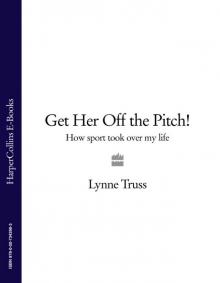 Get Her Off the Pitch! How Sport Took Over My Life
Get Her Off the Pitch! How Sport Took Over My Life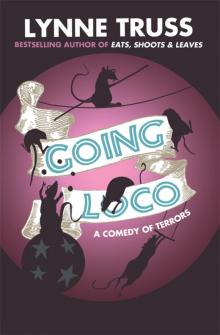 Going Loco
Going Loco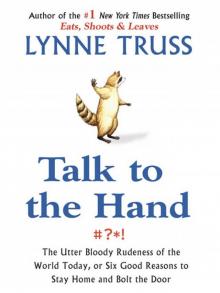 Talk to the Hand
Talk to the Hand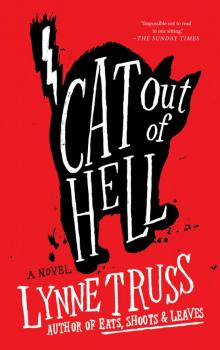 Cat Out of Hell
Cat Out of Hell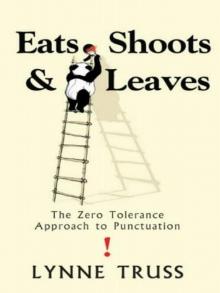 Eats, Shoots and Leaves
Eats, Shoots and Leaves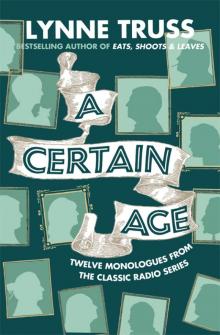 A Certain Age: Twelve Monologues From the Classic Radio Series
A Certain Age: Twelve Monologues From the Classic Radio Series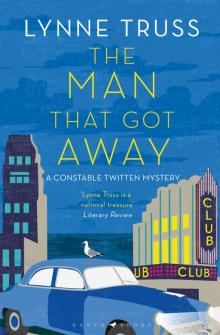 The Man That Got Away
The Man That Got Away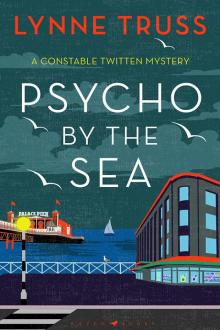 Psycho by the Sea
Psycho by the Sea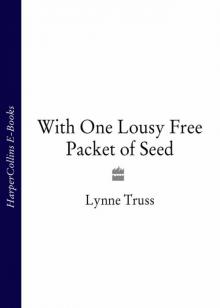 With One Lousy Free Packet of Seed
With One Lousy Free Packet of Seed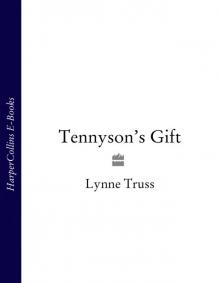 Tennyson's Gift: Stories From the Lynne Truss Omnibus, Book 2
Tennyson's Gift: Stories From the Lynne Truss Omnibus, Book 2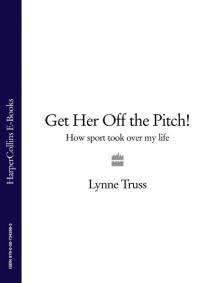 Get Her Off the Pitch!
Get Her Off the Pitch!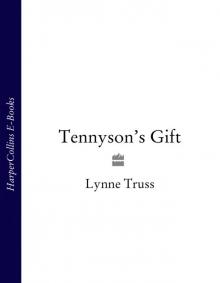 Tennyson's Gift
Tennyson's Gift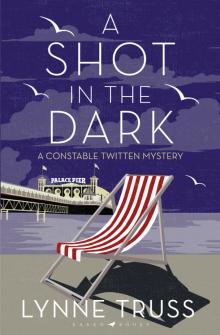 A Shot in the Dark
A Shot in the Dark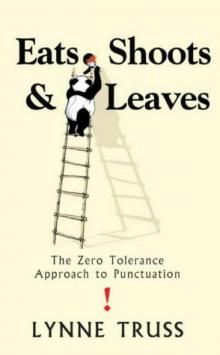 Eats, Shoots and Leaves: The Zero Tolerance Approach to Punctuation
Eats, Shoots and Leaves: The Zero Tolerance Approach to Punctuation